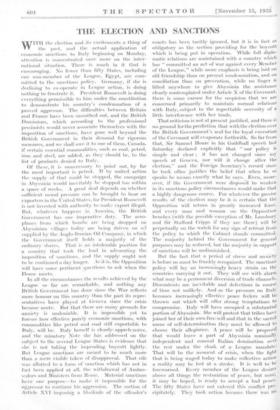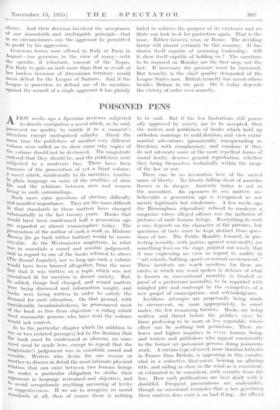THE ELECTION AND SANCTIONS W ITH the election and its excitements
a thing of the past, and the actual application of economic sanctions to 'Italy beginning on Monday, attention is concentrated once more on the inter- national situation. There is much in it that is encouraging. No fewer than fifty States, including one non-member of the League, Egypt, 'arc com- mitted to the sanctions policy. Germany, if she is declining to co-operate in League action, is doing nothing to frustrate it. President Roosevelt is doing everything permissible to him under the constitution to demonstrate his country's condemnation of a proved aggressor. The difficulties between Britain and France have been smoothed out, and the British Dominions, which according to . the professional pessimistS would never associate themselves with the imposition of sanctions, have gone well beyond the British Government in their demand for rigorous measures, and we shall owe it to one of them, Canada, if certain essential commodities, such as coal, petrol, iron and steel, are added, as they should be, to the list of products denied to Italy.
Of these, it is unnecessary to point out, by far the most important is petrol. If by united action the supply of that could be. stopped, the campaign in Abyssinia would inevitably be stopped too within a space of weeks. A great deal depends on whether sufficient moral pressure can he brought to bear on exporters in the United States, for President Roosevelt is not invested with authority to make export illegal. But, whatever happens in America., the British Government has one imperative duty. The aero- planes from which bombs arc being dropped on Abyssinian villages today arc being driven on oil supplied by the Anglo-Iranian Oil Company, in which the GoVernment itself holds -a majority of the ordinary shares. That is an intolerable position for a country that took the lead in advocating the imposition of sanctions, and the supply ought not to be continued a day longer. As it is, the Opposition Will have some pertinent questions to ask when the House meets.
In all the circumstances the results achieved by the League • so far are remarkable, and nothing any British Government has. done since the War reflects more honour on this country than the part its repre- sentatives have played at Geneva since the crisis became acute. But that there are many grounds for anxiety is undeniable. It is impossible yet to foresee how effectiVe pUtely economic sanctions, with commodities like petrol and coal still exportable to Italy, will be. Italy herself is clearly, apprehensive, and the minatory Note she has addressed on the subject to the 'several League States is evidence that she is not taking the impending boycott lightly. But League sanctions are meant to be much more than a mere visible token of disapproval. That role was allotted to a form of sanction which has not in fact been applied at all, the withdrawal of .Ambas- sadors and Ministers from RoMe. Material sanctions Inive one purposeL--to make it impossible fOr the aggressor to continue his aggressiOn. The section of Article XVI linPOsing a blockade of the Offender's coasts has been tacitly ignored, but it is in fact as obligatory as the section providing for the boycott which is being put in operation. While full diplo- matic relations are maintained with a country which has " committed an act of war against every Member of the League," while more emphasis is being laid on old friendship than on present condemnation, and on conciliation than on prevention, while no finger is lifted. anywhere to give Abyssinia the assistance clearly contemplated under. Article X of the Covenant, there is some excuse for the suspicion that we are Concerned primarily to maintain normal relations with Italy, subject to the regrettable necessity of a little interference with her trade.
That criticism is not at present justified, and there is no ground for the prediction that with the election over the British Government's zeal for the loyal execution of the Covenant will evaporate forthwith. So far from that, Sir Samuel Hoare in his Guildhall speech last Saturday declared explicitly that " our policy is simple and clear ; it has not changed since 1.fly speech at Geneva, nor will it change after the election," and the Foreign Secretary's record since he took office justifies the belief that when lie so speaks he means exactly what he says. Even, more- over, if the Government were disposed to weaken in its sanctions policy circumstances would make that a highly dangerous. course. For whatever the precise results of the election may be it is certain that the Opposition will return in greatly increased' force, and every man and woman on the Opposition benches '(with the possible exception of Mr. LansburY and Sir Stafford Cripps if they are there) will be perpetually on the watch for any sign of retreat from the policy to which the Cabinet stands' conimitted. The majority behind the Government for general purposes may be reduced, but the majority in support of sanctions will be undiminished. • But the fact that a period of stress and anxiety is-before us must be frankly recognised. The sanctions policy will lay an increasingly heavy strain on the countries carrying it out. They will see with alarni what may be a permanent diversion of trade Channels. Discontents are inevitable and defections in course of time not unlikely. And as the pressure on Italy becomes increasingly effective peace feelers will be thrown out which will offer strong temptations to compromise. Italy will have occupied a substantial portion of Abyssinia. She will protest that tribes have joined her of their own free4ill and that in the sacred name of self-determination they must be allowed to choose their allegiance. A peace will be proposed that would leave a part of Abyssinia nominally independent and conceal Italian domination over the rest under the cloak of a. League niazidate. That will be the moment of crisis, when the light that is being waged today to make collective action a reality may be lost at a stroke. It is well to be forewarned. Every member of the Leagne desires above all things the restoration of peace, but none,.
it may hoped, is ready to 'accept 'a bad peace. The fifty StateS have not entered this conflict pre- cipitately. They took action becauSe there. ivas no choice. And their decision involved the acceptance of one immutable and irrefragable principlethat in no circumstances can the aggressor be permitted to profit by his aggression.
Generous terms were offered to Italy at. Paris in August7-too generous , in the view of ,many—with the specific, if reluctant, consent of the Negus. POI. Italy to gain an inch more than that as result of her lawless invasion of Abyssinian territory would Incan, defeat for the League of Nations. And if the League is powerless to defend one of its members against the assault of a single aggressor it has plainly failed to achieve the purpose of its existence and no State _can look to it for protection again. That is the issue. Either Geneva wins, or Rome. The deciding factor will almost certainly. be this country: It has shown. itself capable of assuming leadership ; will it show 'itself ,capable of holding on ? The sanctions to be imposed on Monday are the first step, not the last. If necessary the pressure must be increased. But tenacity is the chief quality demanded of the League States now. British tenacity has saved others besides Britain in the past. On it today depends the victory of order over anarchy.











































 Previous page
Previous page